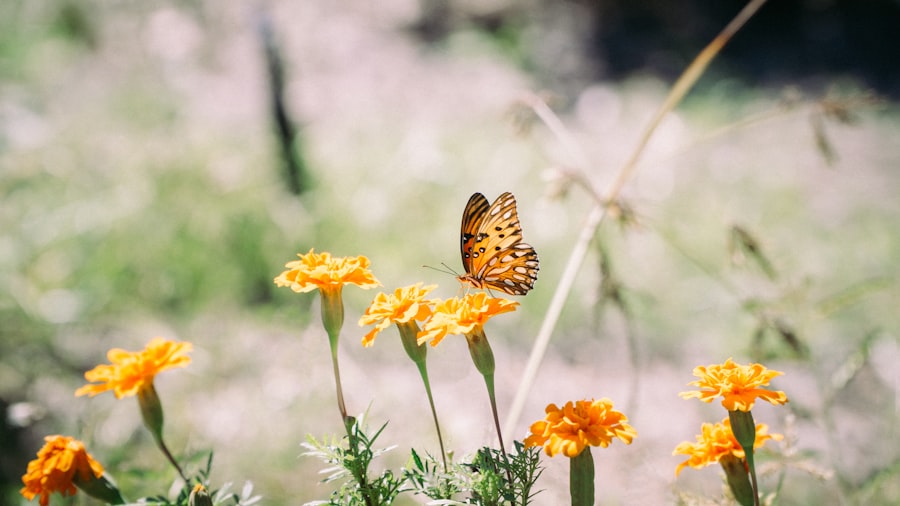Opossums pose a significant threat to chicken owners, as they are known to prey on chickens and their eggs. These nocturnal mammals are opportunistic feeders that will readily exploit accessible chicken coops. Opossums can also transmit diseases such as leptospirosis and salmonella, which may affect both poultry and humans.
Consequently, chicken owners must implement preventive measures to protect their flocks and deter opossums from their property. One natural and effective method for repelling opossums from chicken coops involves the use of marigolds. These bright, colorful flowers possess natural properties that deter opossums and other pests.
This article will examine the advantages of using marigolds as an opossum deterrent, provide guidance on planting them around chicken coops, discuss alternative natural methods for opossum control, offer tips for safeguarding chickens against opossums, and address potential limitations of using marigolds for this purpose.
Table of Contents
- 1 The Benefits of Marigolds in Deterring Opossums
- 2 How to Plant Marigolds Around the Chicken Coop
- 3 Other Natural Methods for Opossum Control
- 4 Tips for Keeping Opossums Away from Chickens
- 5 Potential Drawbacks of Using Marigolds for Opossum Control
- 6 Using Marigolds as a Natural Opossum Deterrent for Chickens
- 7 FAQs
Key Takeaways
- Opossums are a threat to chickens due to their tendency to prey on them and their eggs.
- Marigolds can help deter opossums from the chicken coop due to their strong scent and unappealing taste to the pests.
- Planting marigolds around the chicken coop can create a natural barrier against opossums and add a pop of color to the area.
- Other natural methods for opossum control include securing the coop, removing food sources, and using motion-activated lights or sprinklers.
- To keep opossums away from chickens, it’s important to keep the coop clean, secure any openings, and remove any potential food sources from the area.
- Potential drawbacks of using marigolds for opossum control include the need for regular maintenance and the possibility of the pests becoming accustomed to the scent over time.
- In conclusion, using marigolds as a natural opossum deterrent for chickens can be an effective and aesthetically pleasing method for keeping the pests at bay.
The Benefits of Marigolds in Deterring Opossums
Repelling Opossums with Fragrance
Marigolds are known for their strong fragrance, which is unappealing to opossums and other pests. The scent of marigolds is believed to mask the odors that attract opossums to chicken coops, making the area less attractive to them.
Natural Insect Repellent
Additionally, marigolds contain natural compounds that act as a natural insect repellent, which can help keep other pests at bay as well. This makes marigolds a multi-purpose solution for protecting chickens from potential threats.
Easy to Grow and Maintain
Furthermore, marigolds are easy to grow and maintain, making them a convenient and cost-effective option for opossum control. They thrive in various soil conditions and require minimal care, making them an ideal choice for chicken owners who may not have a green thumb.
Creating a Natural Barrier
By incorporating marigolds into the landscape around the chicken coop, chicken owners can create a natural barrier that deters opossums and enhances the overall aesthetics of the property.
How to Plant Marigolds Around the Chicken Coop

Planting marigolds around the chicken coop is a simple and effective way to deter opossums and protect the flock. When selecting marigolds for this purpose, it is important to choose varieties with strong fragrance, such as French marigolds (Tagetes patula) or Mexican marigolds (Tagetes erecta). These varieties are known for their potent scent, which is key to repelling opossums and other pests.
To plant marigolds around the chicken coop, begin by preparing the soil in the desired area. Marigolds prefer well-drained soil with plenty of sunlight, so choose a location that meets these requirements. Once the soil is prepared, dig small holes for each marigold plant, ensuring that they are spaced evenly apart.
Place the marigold plants in the holes and cover the roots with soil, gently patting it down to secure the plants in place. Water the newly planted marigolds thoroughly to help them establish their roots in the soil. It is important to continue watering the marigolds regularly, especially during dry periods, to ensure they remain healthy and vibrant.
As the marigolds grow, they will begin to emit their strong fragrance, creating a natural barrier that deters opossums from approaching the chicken coop.
Other Natural Methods for Opossum Control
In addition to using marigolds, there are other natural methods that can be employed to control opossums and protect chickens. One effective approach is to keep the area around the chicken coop clean and free of food sources that may attract opossums. This includes securing trash cans, removing fallen fruits or vegetables, and storing chicken feed in secure containers.
By eliminating potential food sources, chicken owners can make their property less appealing to opossums. Another natural method for opossum control is to install motion-activated lights or sprinkler systems around the chicken coop. Opossums are nocturnal creatures and are often deterred by sudden bright lights or bursts of water.
By installing these deterrents, chicken owners can discourage opossums from approaching the coop during the night, reducing the risk of predation. Additionally, maintaining a secure and sturdy chicken coop is essential for protecting chickens from opossums and other predators. Ensure that the coop is constructed with durable materials and that all openings are securely sealed to prevent opossums from gaining access.
Regularly inspect the coop for any signs of damage or wear and make necessary repairs to maintain its integrity.
Tips for Keeping Opossums Away from Chickens
In addition to using natural methods for opossum control, there are several tips that chicken owners can follow to keep opossums away from their flock. One important tip is to avoid leaving food or water sources outside of the chicken coop during the night. Opossums are attracted to food and water, so removing these temptations can help discourage them from lingering around the property.
Another tip is to regularly inspect the perimeter of the chicken coop for any potential entry points that opossums could exploit. This includes checking for gaps in fencing, holes in the ground, or any other openings that could allow opossums to access the coop. By identifying and addressing these vulnerabilities, chicken owners can fortify their property against potential opossum intrusion.
Furthermore, it is important to be vigilant and observant of any signs of opossum activity around the property. This includes looking for tracks, droppings, or any evidence of attempted entry into the chicken coop. By staying aware of these signs, chicken owners can take proactive measures to address any potential threats posed by opossums.
Potential Drawbacks of Using Marigolds for Opossum Control

Limited Effectiveness
One of the main drawbacks of using marigolds as an opossum deterrent is that they may not provide a foolproof solution on their own. While they can help deter opossums, they may not be enough to completely eliminate the risk of predation on your chickens.
Toxicity to Chickens
Another potential issue with using marigolds is that some varieties can be toxic to chickens if ingested in large quantities. It’s essential to take precautions to ensure that your chickens don’t have access to the marigolds. You can do this by planting them in areas that are inaccessible to your flock or by using fencing to create a barrier between the plants and your chickens.
Maintenance Requirements
Finally, while marigolds are relatively low-maintenance plants, they still require some care and attention to thrive. If you neglect your marigolds, they may become less effective as an opossum deterrent. Therefore, it’s crucial to commit to maintaining your marigold plants to maximize their effectiveness.
Using Marigolds as a Natural Opossum Deterrent for Chickens
In conclusion, marigolds offer a natural and effective solution for deterring opossums from chicken coops. Their strong fragrance and natural insect-repelling properties make them an ideal choice for creating a barrier that deters opossums and protects chickens from potential threats. By planting marigolds around the chicken coop and incorporating other natural methods for opossum control, chicken owners can create a secure environment for their flock.
While there are potential drawbacks to using marigolds for opossum control, such as their limitations as a standalone solution and potential toxicity to chickens, these can be managed with proper planning and care. By understanding the benefits and considerations of using marigolds as a natural opossum deterrent, chicken owners can make informed decisions about how to best protect their flock from potential threats posed by opossums. With proper implementation and maintenance, marigolds can serve as a valuable tool in creating a safe and secure environment for chickens.
If you’re looking to keep your chickens safe from opossums, you may also be interested in learning about the best ways to protect your chicken coop. Check out this article on chicken coop portage for tips on how to secure your coop and keep your chickens safe from predators.
FAQs
What are marigolds?
Marigolds are a type of flowering plant that belong to the Tagetes genus. They are known for their bright and vibrant flowers, and are commonly used for ornamental and gardening purposes.
Do marigolds keep opossums away from chickens?
There is no scientific evidence to support the claim that marigolds can effectively keep opossums away from chickens. While some people believe that the strong scent of marigolds may deter opossums, there is no conclusive proof of their effectiveness as a deterrent.
What are some effective methods for keeping opossums away from chickens?
Some effective methods for keeping opossums away from chickens include securing the chicken coop with sturdy fencing, using motion-activated lights or sound devices, and removing potential food sources such as fallen fruits or grains.
Are there any plants or herbs that are known to repel opossums?
While there are anecdotal claims about certain plants or herbs repelling opossums, there is limited scientific evidence to support these claims. It is important to rely on proven methods such as securing the chicken coop and removing food sources to effectively deter opossums.
Meet Walter, the feathered-friend fanatic of Florida! Nestled in the sunshine state, Walter struts through life with his feathered companions, clucking his way to happiness. With a coop that’s fancier than a five-star hotel, he’s the Don Juan of the chicken world. When he’s not teaching his hens to do the cha-cha, you’ll find him in a heated debate with his prized rooster, Sir Clucks-a-Lot. Walter’s poultry passion is no yolk; he’s the sunny-side-up guy you never knew you needed in your flock of friends!







